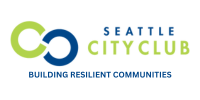Following a successful Civic Boot Camp: Digital two weeks prior, Seattle CityClub convened a second panel of experts on March 27 to go in-depth on how COVID-19 is affecting marginalized communities and what we can do to help.
“When we’re talking about health care inequities, we’re talking about a lot of barriers, whether it’s cultural or language or religious,” said Dr. Ahmed Ali, a co-founder of Somali Health Board whose practice focuses on immigrant and refugee communities.
Ali was one of four experts to speak at length and answer attendee questions over the course of the hour-long Boot Camp, which also dove into COVID-19’s impact on the LGBT community, the homeless, and other marginalized populations in King County.
“We’re working really hard to try and mitigate harm,” said Public Health – Seattle & King County Equity Officer Mariel Torres Mehdipour. “There are so many moving pieces with COVID-19.”
Those moving pieces present an acute challenge for those working in marginalized communities, where access to medicine and information can be hampered. Dr. Peter Shalit’s practice focuses on the LGBT community, where he’s seen a reluctance to visit doctors and hospitals.
“What we see in our population is a sense, for many of them, of stigma and of being treated inappropriately or disrespectfully,” Shalit said. “Folks have been traumatized in the past by their experiences in interacting with the medical community, so they’re reluctant to seek care.”
For King County’s homeless population, the number of moving pieces increases dramatically.
“We have, on any given day, about 11,000 or 12,000 people in our county who are living homeless,” said Nicole Macri, a State Representative and the Deputy Director of Strategy for Downtown Emergency Service Center. “About half of those folks have access to some kind of shelter; about half have no access to any kind of shelter.”
With many social services suspending operations, many of the county’s homeless end up huddled together in tents for warmth – something of particular concern given conronavirus’ contagiousness.
“Because of the nature of this crisis, we’ve closed things down so much more quickly than we’ve opened up things,” she said. “They’re literally freezing. They can’t get inside even for a few minutes a day. Meal programs are closed, they have no access to running water to wash their hands or go to the bathroom… This presents huge risks, especially around COVID-19.”
Food insecurity, of course, goes beyond the homeless. The closure of so many public spaces has impacted many people’s access to food, including members of the immigrant and refugee community.
“We have a lot of folks who oftentimes will go to mosques and even public facilities to get food and assistance, particularly the elderly,” Ali said.
But help is coming. The City of Seattle has begun setting up portable showers and hand-washing stations near libraries, parks, and the Downtown core. Vouchers are being issued to those struggling with basic needs.
And others can help as well.
“Go and visit the elderly folks, or at least call these folks and make sure they’re getting what they need – especially groceries and medication,” Ali said. “Just checking on folks is one of the most important things.”
Also important: Keeping up on the latest health and safety recommendations coming from state and federal experts.
“We really need people to follow public health directives and guidance,” Macri said. “It’s eminently difficult for all of us to do it… but it is essential.”
And, finally, is remembering to keep a sense of perspective.
“There’s a lot of hate and bias coming out right now, unfortunately, and it has been since the first case of COVID-19 was reported,” Torres Mehdipour said. “It’s really important for us to be able to speak up and remind folks that viruses don’t discriminate. Because they really don’t.”
RESOURCES
King County’s anti-stigma resource guide
WA Health Benefit Exchange coronavirus FAQ
King County’s COVID-19 fact sheet
PANELISTS
- Public Health – Seattle & King County Equity Officer Mariel Torres Mehdipour
- Dr. Peter Shalit of Peter Shalit & Associates
- Somali Health Board Executive Director Ahmed Ali
- Downtown Emergency Service Center (DESC) Deputy Director of Strategy Nicole Macri
ABOUT
Doctor Shalit & Associates is an independent clinic located on First Hill in Seattle. Peter Shalit, MD, PhD, has been providing quality medical care to our community since 1990. doctorshalit.com
The Downtown Emergency Service Center (DESC) provides integrated services including housing, emergency shelter, crisis intervention, and health care to thousands of homeless and formerly homeless people every day. They fight for public resources and policies that serve our most vulnerable and marginalized neighbors: those living with mental illness, substance use disorders, and other disabilities. desc.org
Public Health – Seattle & King County works to protect and improve the health and well-being of all people in King County as measured by increasing the number of healthy years that people live and eliminating health disparities. kingcounty.gov/depts/health.
Somali Health Board is a 501(c)3 non-profit, grassroots organization formed in 2012 by Somali health professionals and volunteers with ambitious goals of eliminating and reducing health disparities that disproportionately affect new immigrants and refugees within King County. somalihealthboard.org
Seattle CityClub is a nonpartisan, 501(c)(3) nonprofit organization improving the civic health of the Puget Sound region by providing programs that bridge politics, sectors and generations to inform and engage residents and community leaders. seattlecityclub.org.
